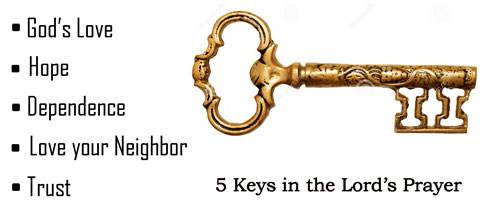
So how is your barn ? Parable of the Rich Fool
The second part of this scripture is the reframing of the man’s question and the parable -“Take care! Be on your guard against all kinds of greed; for one’s life does not consist in the abundance of possessions.” Since there is stuff to be divided there could be “abundance of possessions” and the next step beyond that – greed
The Greek word used here for greed means “yearning for more”. It is a form of idolatry. If greed is a desire to get more — then there is never a point where a greedy person has enough. Greed can never be satisfied. It is always looking to get more. In other places, there are writings against greed. 1 Corinthians 6:9-11 and Ephesians 5:3-5. The greedy will not inherit the kingdom of God. It brings god’s wrath. greed can take many forms: the greed for attention, the greed for control, the greed for security.
Luke, by situating the parable of the rich fool right in the middle of Jesus’ predictions of his own death and the plots to kill him, connects this universal human desire for more with universal human insecurity and fear of death.
The parable is about a farmer who does well – he has produced abundantly and has no place to store his crops so he will build larger barns. So what’s wrong with this ? David Lose causes us to assess the situation “He is not portrayed as wicked – that is, he has not gained his wealth illegally or by taking advantage of others. Further, he is not portrayed as particularly greedy. Indeed, he seems to be somewhat surprised by his good fortune as he makes what appears to be reasonable plans to reap the abundance of the harvest. What is wrong, we might therefore ask, about building larger barns to store away some of today’s bounty for a potentially leaner tomorrow?
Lose goes on. “Except for two things. First, notice the farmer’s consistent focus throughout the conversation he has with himself: “What should I do, for I have no place to store my crops?” Then he said, “I will do this: I will pull down my barns and build larger ones, and there I will store all my grain and my goods. And I will say to my soul….”
The relentless use of the first person pronouns “I” and “my” betray a preoccupation with self. There is no thought to using the abundance to help others, no expression of gratitude for his good fortune, no recognition of God at all. The farmer has fallen prey to worshiping the most popular of gods: the Unholy Trinity of “me, myself, and I.” This leads to, and is most likely caused by, a second mistake. He is not foolish because he makes provision for the future; he is foolish because he believes that by his wealth he can secure his future: “Soul, you have ample goods laid up for many years; relax, eat, drink, be merry.”
Wealth is not the problem but how we use it – wealth for its own enjoyment or own end. It’s thinking that possessions lead to a satisfied life. Bigger barns do not necessarily bring happiness and contentment. They rob us of the person who builds the barns. People retire and set them up to separate themselves from a world they help to build. The man in this story does not have the vision and/or imagination to see beyond his own walls. He is his own prisoner.
The text says that the man decided to gather in these new barns not just the grain from the harvest but “my goods” (v. 18). He is thinking of barns not just for the grain but also for his “goods.” He can kill two birds with one stone, but in Jesus’ parable, it is as if he is killing his soul by the expansion project. Then he has thoughts that he has made it and can kick back. Idea of celebrate goes back to the parable of the prodigal son to describe the festive atmosphere at the return of the prodigal.” In the end the grim reaper may be coming for him.
The story ends:” So it is with those who store up treasures for themselves but are not rich toward God.”
The parable tells us about two different kinds of riches–those toward oneself and those toward God
That is, the question to put to our hearers (and also ourselves) is not, “Is material abundance bad?” but rather, “Is our material abundance sufficient to meet the weight of meaning, significance, and joy that we seek?” Can our wealth secure a relative degree of comfort? Certainly. Can it grant to us confidence that we are worthy of love and honor and in right relationship with God and neighbor? Certainly not. Only as we recognize that the gifts of ultimate worth, dignity, meaning, and relationship are just that – gifts offered freely by God – can we hope to place our relative wealth in perspective and be generous with it toward others.
How does one become “rich towards God”? There is a parallel with the Good Samaritan. There the question “What must I do to inherit eternal life?
1. Faith in God. Worship is where we are reoriented toward a way of life that seeks the peace and justice of God’s kingdom. Worship is where we find the inner resources to follow the example of Christ in our daily lives. Worship is where we become “heavenly minded” in the words of St. Paul enough to be able to do some earthly good in this world. It’s our starting point.
2. Approaching God as hungry, needy, people — letting God give us what we need rather than trying to secure it on our own. The gift is not making money for its own sake but gifts of ultimate worth, dignity, meaning, and relationship are just that – gifts offered freely by God. We have people that done this is history and they are called saints.
3. Using our wealth to be generous with it toward others, sharing God’s life. Using wealth responsibility to see that it all comes from God and should be used to further God’s kingdom. Paul in Colossians has a concern with how you live your life here and now—including purity, respect, honesty, and compassio
On another level, this parable is about security. We try to build in our own security and control when we know life is insecure and uncertain. The farmer is called “fool” because of neither his wealth nor ambition but rather because he accords finite things infinite value. He doesn’t see his own life as on loan from God. He has tried to insulate himself from fate and fortune through productive farming and adequate finances, and he has come up empty. Since 9/11 we have inundated with super hero movies – over 30 movies within 6 years after the event. This is another way to promote security.
Lee Koontz in article on his passage quotes Theologian Reinhold Niebuhr. Niebuhr “in an article of this passage. went so far as to say that human nature was paradoxical. On the one hand, we are immersed in nature and subject to all of its perils, including death. But on the other hand, human beings have the ability to transcend nature and ponder not only our finitude and the reality of death but also how we might respond to it. (Reinhold Niebuhr, The Nature and Destiny of Man (New York 1941), p. 182.) We are bound by our limited human nature, our finitude, but at the same time we are free to respond to the perils of life on earth in any way we choose. That, I believe, is what Jesus’ parable of the rich fool is really about. It’s about how to respond to insecurity, finitude, and death.”







